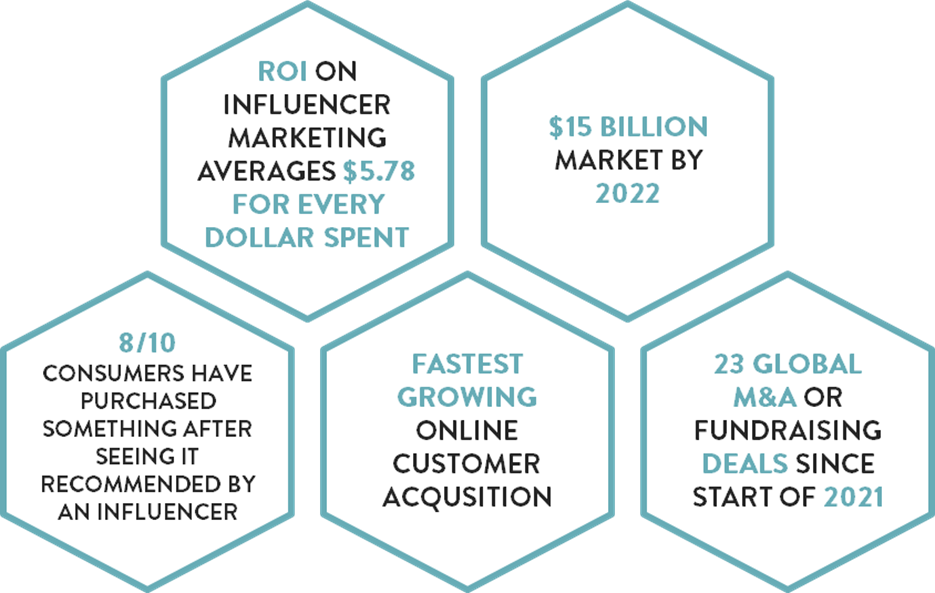The arrival of influencer marketing to the mainstream
Influencer marketing is a relatively new industry but has experienced explosive growth in recent years as it has become an integral part of marketing strategies for many global brands. It is on track to become a $15 billion global industry by 2022, a remarkable increase from its estimated value of $1.7bn in 2016. (Source: Business Insider / Influencer Marketing Hub).
For years, specialist influencer businesses have been championing how influencer marketing is an effective advertising channel, as their data-led approaches can demonstrate direct ROI. The importance of this marketing channel has been accelerated by Covid-19 and changing consumer habits, with people spending more time online where they typically use social media platforms to make their purchasing decisions. A recent article in The Drum demonstrates this change by quoting that “the shift of advertising spend from traditional marketing channels into influencer marketing has been one of the defining marketing stories of the pandemic”.
We have discussed the current market with Alex Payne & Tanya Hamilton-Smith from The Room who remarked that “brands that are succeeding currently are those that seize the moment, are aware of cultural changes and react immediately”. They use a brilliant example of influence playing its part in this with the DoggFace and Ocean Spray story: an organic video goes viral inadvertently promoting an Ocean Spray drink and the brand reacts shortly afterwards rewarding the unintended influencer and then curating their own content to capitalise on the unpaid authentic post.
Disruption is on the horizon
Authenticity is becoming increasingly important as influencers are faced with more commercial opportunities. Consumers are demanding authenticity and transparency, and brands will favour influencers where there is a genuine connection. “We believe that brands will need to focus on collaborations rather than commercials in order to get the best cut through” – Alex Payne. For brands working with influencers, there has been a noticeable shift away from one-off paid posts to establishing more long-term relationships in the form of brand ambassadors.
Technology, the main disrupter to the influencer marketing industry, will play a key role in preserving authenticity. We have seen some recent examples of this with Tailify (a full-service influencer marketing agency) developing a unique AI influencer selection tool based around behavioural science, and Influencer’s (a leading influencer marketing and branded content solution) new tech platform called Waves, which will offer data transparency around campaign insights. Other notable influencer businesses in the space that offer a technology angle include Billion Dollar Boy, Takumi, and The Room.
“For brands, finding the right balance between authenticity and value will be key to successful influencer marketing campaigns” – said Ella Wills, Marketing Executive at WY Partners.
A transformative year of M&A / Fundraising
The flurry of M&A activity over the past few months has sent a clear message to the wider advertising / marketing industry that influencer marketing is here to stay – since the turn of the year, there have been 23 global M&A or fundraising deals in the influencer space (Source: Pitchbook).
High profile private equity houses have made significant moves in the UK with the most notable being Inflexion’s minority investment in Goat (a global social media marketing agency). We have also seen Guinness Asset Management put £3.7m into Tailify and, earlier on in the year, BGF investing in Genflow (a full-service brand creation agency). PE houses haven’t been the only ones getting involved as PR / Communications specialist Karla Otto acquired Parisian based platform, Lefty.
The sentiment is no different in the US with two major deals completing in April. Five Elms has invested $8.5m into Tagger (an influencer marketing platform and social listening tool) and Meltwater (a leading global SaaS provider of media intelligence and social analytics) has acquired Klear, an Israeli SaaS platform. Sir Martin Sorrell has also made sure his digital first group S4 Capital has an influencer offering when Mediamonks merged with IMA (a full-service influencer marketing agency) back in 2019.

A bright future for M&A in influencer marketing
The faith that buyers and investors are showing in the industry have served to validate influencer marketing as a mainstream advertising channel by itself. The debate, however, will rumble on as to where influencer businesses will fit as part of the wider marketing sector. Key topics of conversation that are likely to drive the longer-term M&A include:
- How will agencies / platforms adapt to potential changes in law with respect to the core social media platforms like Tik Tok, Instagram and Snapchat?
- Will influencer marketing businesses remain as standalone, or could they consolidate alongside adjacent marketing strategies like referral / loyalty, branded content, activation, and publishers?
- Will there be winners out of the technology platforms, tech-enabled agency and traditional agency models?
Alastair Greenfield, an Associate Director from WY Partners, believes “that the recent M&A and fundraising activity in influencer marketing is showing no signs of slowing down and we can expect to see more deals in the coming months as more investors look to enter into the market and buyers are exploring consolidation opportunities”.
Thank you to Esme Rice from Tailify and Alex Payne & Tanya Hamilton-Smith from The Room for their valuable input.
Find out more about what we do here.
Contact Alastair Greenfield at agreenfield@wypartners.com or Ella Wills at ewills@wypartners.com if you have any questions or wish to discuss anything further.



